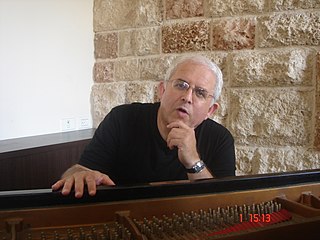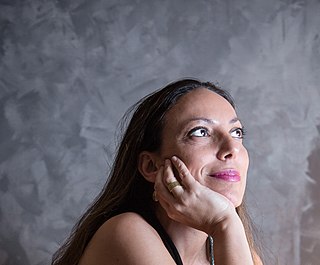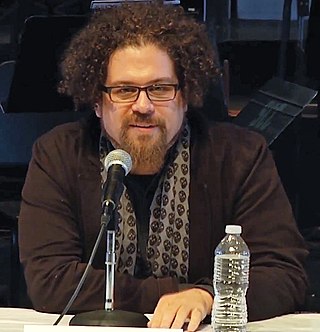Related Research Articles
Shulamit Ran is an Israeli-American composer. She moved from Israel to New York City at 14, as a scholarship student at the Mannes College of Music. Her Symphony (1990) won her the Pulitzer Prize for Music. She was the second woman to win the Pulitzer Prize for Music, the first being Ellen Taaffe Zwilich in 1983. Ran was a professor of music composition at the University of Chicago from 1973 to 2015. She has performed as a pianist in Israel, Europe and the U.S., and her compositional works have been performed worldwide by a wide array of orchestras and chamber groups.

The Kronos Quartet is an American string quartet based in San Francisco. It has been in existence with a rotating membership of musicians for 50 years. The quartet covers a very broad range of musical genres, including contemporary classical music. More than 1,000 works have been written for it.
Osvaldo Noé Golijov is an Argentine composer of classical music and music professor, known for his vocal and orchestral work.

Giora Feidman is an Argentine-born Israeli clarinetist who specializes in klezmer music.

Moshe Zorman is an Israeli composer. His works include nine operas —among them “The Inn of Spirits” after Natan Alterman’s play of the same name—as well as works for symphony orchestra, chamber groups and choirs. His works and arrangements have been performed by the Israel Philharmonic Orchestra, the Welsh BBC Orchestra, the Jerusalem Symphony Orchestra (IBA), the Israel Sinfonietta Beer-Sheva and the Baltimore Symphony, among others. He has also written music for theatre productions at the Habima and Cameri theatres in Israel and for the Inbal and Bat-Sheva dance companies.

The Jerusalem Symphony Orchestra is a major orchestra of Israel. Since the 1980s, the JSO has been based in the Henry Crown Symphony Hall, part of the Jerusalem Theater complex.

André Hajdu was a Hungarian-born Israeli composer and ethnomusicologist.
Ella Milch-Sheriff is an Israeli composer, winner of ACUM award for lifetime achievfment (2022). Born in Haifa, Israel on September 1, 1954, Milch-Sheriff began her career as a composer at the age of 12. During her military service she composed, performed and interpreted her own songs after which she returned to classical music studying composition under the direction of Professor Tzvi Avni and graduating in composition from the Rubin Academy of Music at Tel Aviv University.
Benjamin Yusupov is a classical composer, conductor and pianist.

Gil Shohat is an Israeli classical music composer, conductor, pianist and lecturer.
Emanuel Vahl is a Ukrainian-Israeli composer. Vahl has composed more than 100 works, including preludes, songs without words, and chamber music. He taught Harmony and Composition at the Conservatory "Hasadna" in Jerusalem, and now he teaches at the Dance Studio of Jerusalem. Vahl has been a member of the Union of Israeli Composers and AQUM since 1991.

Orit Wolf is an Israeli pianist, composer, poet and lecturer. Currently holds a lecturer position at Reichman University, Israel. From the 2022 to 2023 academic year, Wolf has been Artist in Residence at the Technion where she also teaches at the Humanities and Arts Department and at the MBA program.

Max Stern is a composer, critic, double-bassist, conductor and educator. He has created a rich genre of biblical compositions blending East and West in contemporary and traditional genres.
Betty Olivero is an Israeli composer and music educator.
Boris Pigovat is an Israeli composer. Many of his works have been performed throughout the world. He studied at Gnessin Music Institute in Moscow. Between 1978 and 1990 he lived in Tajikistan, and immigrated to Israel in 1990. In 2002 he received his Ph.D. degree from Bar-Ilan UniversityArchived 2007-05-09 at the Wayback Machine (Israel).

David T. Little is a Grammy-nominated American composer, record producer, and drummer known for his operatic, orchestral, and chamber works, most notably his operas JFK,Soldier Songs, and Dog Days which was named a standout opera of recent decades by The New York Times. He is the artistic director of Newspeak, an eight-piece amplified ensemble that explores the boundaries between rock and classical music, and is the Chair of the composition faculty at Mannes School of Music.

Shai Cohen is an Israeli music educator and composer of contemporary classical music.

Yotam Haber is a composer based in Kansas City. He is a 2005 Guggenheim fellow, a 2007 Rome Prize winner in Music Composition., and was named a 2023-2024 Fulbright Distinguished Senior Scholar, teaching and researching at the Jerusalem Academy of Music and Dance.

Michael Seltenreich is an Israeli composer of contemporary classical music based in New York City. He is known for his distinctive, rhythmically captivating and technically sophisticated music, blending elements of modernism and experimentation. His works have been performed by leading ensembles and orchestras around the world, including the Munich Philharmonic, the Israel Philharmonic Orchestra, the Tokyo Philharmonic Orchestra, and the Juilliard Orchestra. He earned commissions from staple institutions such as Lucerne Festival, Aspen Music Festival, and Santa Fe Chamber Music Festival. Seltenreich was the first Israeli to win the prestigious Toru Takemitsu Composition Award and is a recipient of the Israel Prime Minister Award in Composition. In 2022, he received the Music Award from the American Academy of Arts and Letters.
Ron Weidberg is an Israeli composer, musicologist, and pianist. His works have been performed by the Israel Philharmonic Orchestra and the Israel Camerata Jerusalem, among others.
References
- ↑ "See All Visiting Israeli Artists". Israel Institute. Retrieved 13 June 2020.
- ↑ Andrew Muchin (27 March 2019). "World-famous Israeli composer Aviya Kopelman is around Bay for a bit". J. Retrieved 13 June 2020.
- ↑ "Kronos: Under 30 Project". kronosquartet.org. Retrieved 20 January 2018.
- ↑ Schweitzer, Vivien (25 February 2008). "Kronos Quartet – Music – Review". The New York Times. ISSN 0362-4331 . Retrieved 20 January 2018.
- ↑ RagazzeQuartet (5 July 2010), Ragazze Quartet New York, rehearsal Black Widow by Aviya Kopelman , retrieved 20 January 2018
- ↑ "Kvinnoorkestern". kvinnoorkestern.se. Retrieved 13 June 2020.
- ↑ Arthur Rubinstein (6 November 2012), David Fung – Stage I (Scarlatti, Rachmaninov, Kopelman & Ravel) , retrieved 20 January 2018
- ↑ "Konsertrecension: Quartetto de Cremona på Konserthuset". Dagens Nyheter (in Swedish). 21 October 2018. Retrieved 13 June 2020.
- ↑ Smith, Steve (18 April 2011). "Dawn Upshaw and Students at Zankel Hall – Review". The New York Times. ISSN 0362-4331 . Retrieved 20 January 2018.
- ↑ "SF Girls Chorus Responds to COVID-19 With a Virtual Festival". San Francisco Classical Voice. Retrieved 20 June 2020.